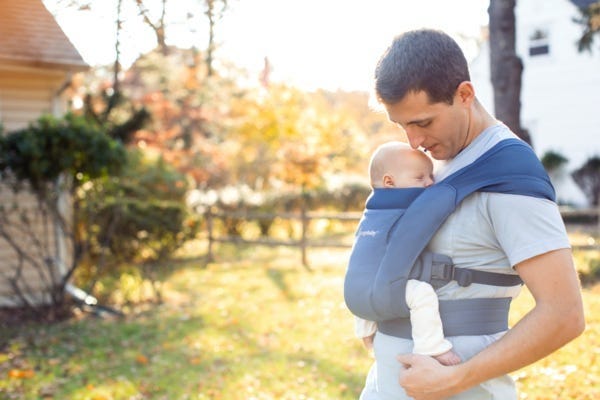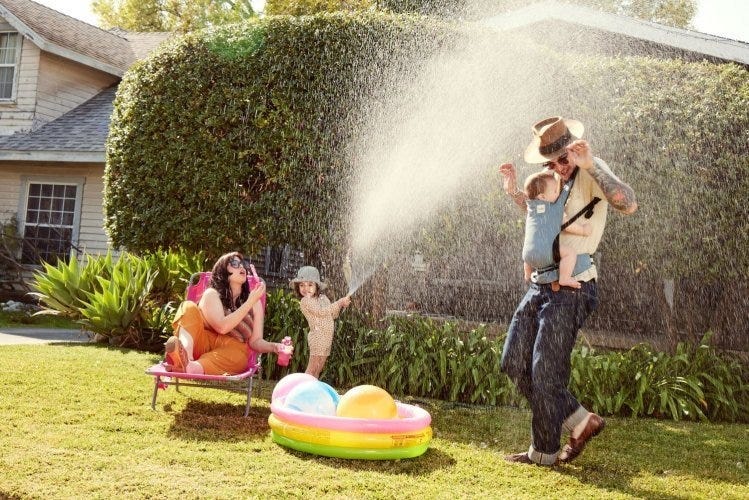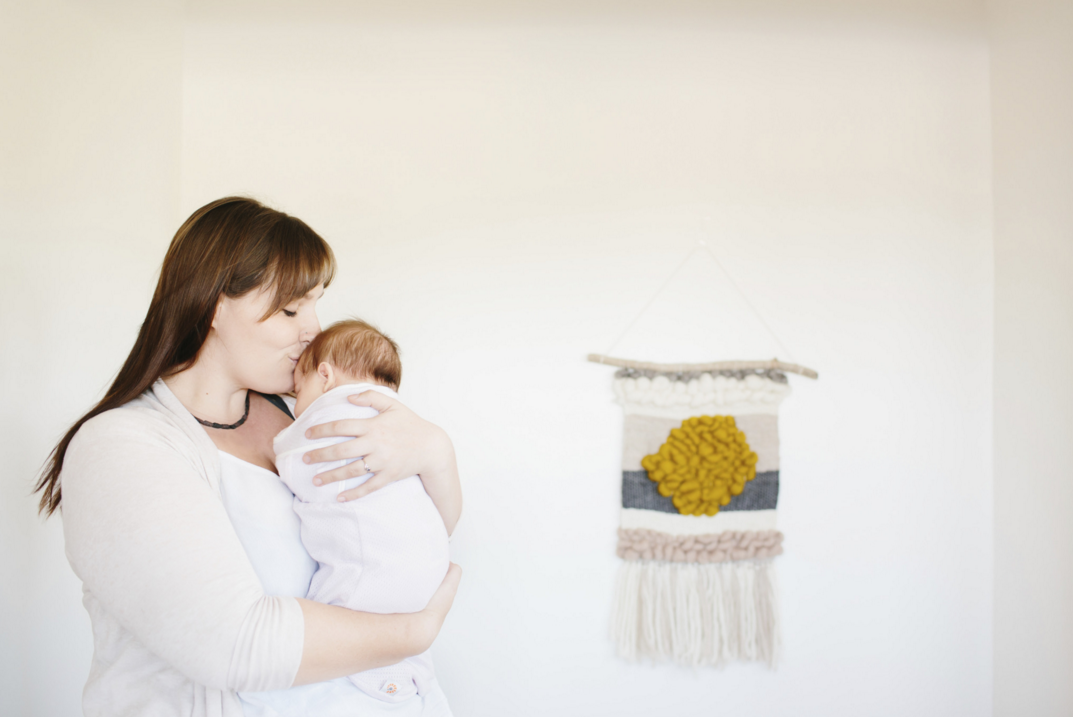
For most parents, infant massage is a rewarding activity in its own right. Just consider the sheer enjoyment of touching and gently rubbing and stroking this little marvel of nature, with its lush, soft and delicately fragrant skin and all its subtle, yet clear signs of appreciation of being massaged. Over and above being a mutually pleasurable activity, research into infant massage over the past decades has established a range of beneficial effects on the infant, and equally important, on the relationship between the mother and her baby. In this article, we will look at some of the effects of infant massage on premature and full-term babies, respectively. These effects include weight gain, sleep organization and mother-baby relationship.
Infant massage for premature infants
Extensive research has been conducted on the effects of infant massage on stable pre-term infants. Certainly, premature birth is no trivial matter. At present approximately 14% of infants in the United States are born prematurely, according to The National Center for Health Statistics. Prematurity, in turn, is one of the leading causes of infant morbidity and mortality, and it results in approximately 15.5 billion dollars in hospital costs per year. Following intensive care treatment, weight gain becomes the main criterion for hospital discharge. Thus, several interventions have been designed to promote preterm infant weight gain, including massage therapy. Several independent, randomized, controlled studies confirm the efficacy of infant massage in promoting weight gain in premature babies, leading to earlier discharge from the hospital. The infant massage protocol, in studies on the effects of massage therapy on neonatal intensive care unit preterm infants, involves moderate pressure stroking (tactile stimulation) and flexion and extension of arms and legs (kinesthetic stimulation). These sessions have varied between 10 and 15 minutes and have been held two to three times a day for 5 to 10 days.
Mothers as massage therapists
The question occasionally arises whether infant massage can be done by mothers or if professional physiotherapy is required to achieve these desired increases in weight gain. An elegant study investigated this issue by assigning preterm infants to three groups. These three groups included one treatment group in which the mothers performed the massage, and another, in which professionals unrelated to the infant administered the treatment. These two groups were then compared to a control group. Over the 10-day study period, the two treatment groups gained significantly more weight compared to the control group suggesting that mothers were able to achieve the same effect as that of trained professionals.
Maternal depression
Benefits on the infant massage were not just observed for the babies involved. Interestingly, the mothers who massaged their infants in one study experienced a decrease in depression symptoms, which are often seen in mothers of preterm infants. In another study using mothers as the massage therapists, even one session was effective in lowering both the mothers' depression and anxiety symptoms.
Moderate pressure is critical
The question of whether light or moderate pressure in the massage therapy is most effective in promoting weight gain has also been addressed in several studies. The evidence to hand suggests that moderate pressure is most optimum. Moderate pressure massage has also been shown to reduce stress behaviors in the massaged infants, compared to the control group.
Infant massage for full-term babies
Weight gain
The effects of infant massage on the baby’s weight gain are not just seen in premature babies. In one study, parents delivered the massage to their full-term newborns from day one to the end of the first month. Those infants gained more weight and gained more length, as well as performed better on the thoroughly validated “Brazelton Neonatal Behavior Assessment Scale,” by the end of the month that the parents provided the massage. The parents involved were taught by massage therapists in infant massage classes whereupon the parents could continue the massages at home.
Sleep organization
Other studies have looked at another crucial element of a baby’s sound development - the baby’s sleep organization, or sleep patterns. Certainly, any parent of a baby suffering from sleep disturbances will appreciate practices which will help reduce this phenomenon. One study sought to examine the effects of infant massage therapy on the baby’s ability to gradually adjust its phases of rest and activity in such a way that these phases align better with day and night - and thus the timing of the parents’ phases of rest and activity. The study also investigated the adjustment of the rhythm of the excretion of sleep hormone melatonin. Starting at the age of approximately ten days old, the babies were given 14 days of infant massage therapy. The babies’ cycles of rest-activity were measured both before and after the 14-day massage therapy, and, subsequently, at six and eight weeks. At eight weeks, the non-massaged control group babies revealed one peak of activity at approximately 12 midnight and another one at approximately 12 noon. Hardly the ideal timing of activity for parents who are trying to get a good night’s sleep to cope with the challenges of life with a newborn…. For the massaged group of babies, at eight weeks, a major peak of activity was early in the morning and a secondary peak in the late afternoon. This is certainly a more accommodating rhythm of baby activity levels for most parents, especially when one or both parents are working. When the researchers looked into the so-called circadian rhythm (which regulates sleep and wake phases), via measurements of the hormone correlated to the circadian rhythm, melatonin, they found the following: At 12 weeks, the nightly urinary excretions of melatonin were significantly higher – about 64% – in the massaged babies, compared to the non-massage control group of babies. This result suggests that the massaged babies had adjusted their circadian rhythm better to life outside the womb, with its alternations between day and night. The massage therapy by mothers in the perinatal period seems to serve as a strong time cue, enhancing coordination of the developing circadian system with environmental cues, such as light, noise and activities of the caregivers. Effects of infant massage on babies’ sleep patterns have been found in several other studies.
Mother-baby relationship
Infant massage differs from some of the other activities that parents will engage in with their baby, such as feeding, changing diapers, transporting, etc., in that there is no direct instrumental purpose in the activity of infant massage, other than that of imparting pleasure and relaxation to the baby. In a study conducted in the UK, parents emphasized the benefits of massage on relaxation and bonding, an activity essential to the early stages of the developing relationship between a baby and its parents. Infant massage was a way of creating a special and enjoyable time together with their baby. It was also a way of learning about their baby, appreciating how responsive the baby could be to them as a parent, and learning to recognize and understand their baby’s communication to them. The parents highlighted how the activity of infant massage improved their relationship with their baby and made their baby happy and content. A randomized, controlled study investigated the effect of infant massage on the mothers’ perception of their babies’ temperament. When the babies were 12 months old, the mothers were asked to evaluate their babies’ temperament. Interestingly, the mothers in the infant massage group rated their babies as having a less difficult temperament than mothers of the control group. The infant massage mothers were more confident of their skills. They were also able to relate better with the baby and qualified it more positively than mothers in the control group. A baby’s temperament is considered to result from the interaction between the baby’s genetic heritage, its environment, and social interactions. Within the environmental factors, the sensitivity of parental involvement and adequate responses from parents is an important element. The study suggests that mothers who learn how to perform infant massage have more positive attitudes towards motherhood and stronger capability to cope with the baby’s temperament. Apart from the sheer fun of giving infant massage, there are plenty of good scientifically supported reasons to engage in it. And to boot, mothers have intuitively been doing it for millennia across the globe, notably in the Far East and South East Asia, so you are taking part in a long continued tradition. Enjoy!
Selected literature: Field T., Diego, M. & Hernandez-Reif, M. Preterm Infant Massage Therapy Research: A Review. Infant Behav Dev. 2010 April ; 33(2): 115–124. Ferber S.G., Laudon M., Kuint J., Weller A. & Zisapel N. Massage therapy by mothers enhances the adjustment of circadian rhythms to the nocturnal period in full-term infants. J Dev Behav Pediatr. 2002 Dec;23(6):410-5. Clarke, C.L., Gibb, C., Hart, J. & Davidson, A. Infant massage: developing an evidence base for health-visiting practice. Clinical Effectiveness in Nursing 2002 6, 121–128 Bárcia, S.1 & Veríssimo, M.2 The relationship between infant temperament and infant massage. Affiliation: 1UIPCDE, ISPA & Universidade Atlântica, 2UIPCDE, ISPA, Portugal. Poster exhibit at World Association of Infant Mental Health biennial conference, Leipzig, 2010. On-line resources: Touch Research Institute http://www6.miami.edu/touch-research/ http://www6.miami.edu/touch-research/Touchpoints%20Summer%202010.pdf The International Association of Infant Massage http://www.iaim.net/ Infant Massage USA http://www.infantmassageusa.org/ The Guild of Infant and Child Massage (United Kingdom) http://www.gicm.org.uk/ International Association of Infant UK Chapter http://www.iaim.org.uk/
Emotional Benefits of Getting Outside
Spending time in nature with your baby can strengthen the bond between you. The simple act of holding your baby close, feeling their warmth, and sharing new experiences together can create strong emotional connections. It’s also a wonderful way to reduce stress and improve your mood. When my littles were extra fussy, I’d take a walk around the neighborhood. Even though I don't live in an area with trails and surrounded by nature, simply behind outside changed everything. A little vitamin D does wonders!
Cognitive Development
Nature is a sensory wonderland for babies. The different sights, sounds, and smells can stimulate your baby’s senses and promote cognitive development. Watching leaves rustle, hearing birds chirp, and feeling the texture of a tree bark can all contribute to their learning and development.
All About Baby Carriers for Nature Adventures
Choosing the Right Baby Carrier
When it comes to selecting the best baby carrier for summer adventures, there are several options to consider.
Types of Baby Carriers:
- Wraps: Perfect for newborns, providing a snug and secure fit.
- Slings: Ideal for quick and easy use, offering good ventilation.
- Soft Structured Carriers: Versatile and comfortable for both parent and baby, suitable for longer trips.
Factors to Consider:
- Baby’s Age and Weight: Ensure the carrier is appropriate for your baby’s size and weight. For example, Ergobaby’s Embrace Newborn Carrier is perfect for the fourth trimester where baby is small and you’re looking for an easy way to stay close. As they grow, you’ll want to upgrade to an all-position carrier that’s meant for growing babies.
- Parent’s Comfort and Ergonomics: Look for carriers with padded shoulder straps and lumbar support if you’re planning on longer outings.
- Ease of Use: Choose a carrier that is easy to put on and take off.
- Climate and Breathability: Opt for carriers made of breathable fabrics to keep you and your baby cool in hot weather.
Safety Tips:
- Proper Positioning: Ensure your baby is seated correctly, with their legs in an "M" position and their head should be close enough to kiss.
- Checking for Wear and Tear: Regularly inspect your carrier for any signs of damage.
- Ensuring Adequate Support: Make sure the carrier provides proper support for your baby’s head and neck.
Exploring Nature with a Baby Carrier
Ideal Spots for a Nature Walk with Baby
- Parks and Gardens: Great for leisurely walks and picnics.
- Nature Trails and Forests: Perfect for more adventurous outings.
- Beaches and Lakesides: Wonderful for enjoying the water and sand, with the right carrier.
Activity Ideas
- Hiking: Enjoy a scenic hike with a hiking baby carrier that offers support and storage.
- Bird Watching: Use your carrier to keep your baby close while you explore and observe wildlife.
- Picnics: A carrier can free up your hands, making it easier to carry picnic supplies.


Advantages of Using Strollers for Nature Adventures
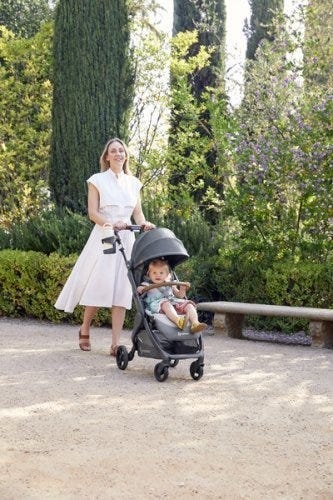

While baby carriers are fantastic for mobility and closeness, depending on the adventure of choice you might want to be a stroller along too.
There are a LOT of baby stroller options on the market. So we understand how confusing it can be to choose the one that’s right for your family. Not only are there a variety of brands, but a variety of strollers that serve different purposes.
There are a few types of strollers on the market:
- Full-sized stroller: This is typically the stroller parents thing of buying for all its versatility.
- Lightweight or umbrella stroller:These compact strollers are perfect for on-the-go adventures.
- Jogging stroller: Designed for parents who want to combine fitness with outdoor adventures.
- Double stroller: Designed for parents with multiple kids, especially twins.
- Car seat carrier: These strollers connect to a specific car seat. We don't typically recommend these as they can be unsafe for baby and uncomfortable for parents who are pushing.
Learn more about the types of strollers and which one would be best for you.
Benefits of Bringing a Stroller
- Storage Space for Gear: Ample room for carrying all your essentials like a diaper bag, beach toys and more.
- Shade and Weather Protection: Built-in canopies to shield your baby from the sun when they are lounging.
- Options: If you have more than one kid, you can stroll with one and carry the other. Or, if you’re getting warm or your little one is getting fussy, you can switch up their position from stroller to carrier or vice versa.
Safety Tips for Strollers
- Ensure your stroller is in good working condition. Make sure buckles are still buckling and that there are no rips or holes that could compromise your baby’s safety.
- Use sunshades or bug nets to protect your little one’s skin.
- Securing the baby properly: always buckle up your baby for safety even if you think they are old enough to go without the buckle.
Combining Baby Carriers and Strollers
For the ultimate flexibility, consider using both a baby carrier and a stroller on your outings.
Combining both options allows you to adapt to different situations. Use the carrier for more rugged trails and switch to the stroller for smoother paths or when your baby needs a nap.
Transition Tips
- Smooth Transitions: Plan stops where you can easily switch from carrier to stroller.
- Pack Light: Only bring essentials to make transitions easier.
Tips for a Successful Adventure
Planning Ahead
- Route Planning: Choose baby-friendly trails and parks. Check local mom groups or outdoor groups and get recommendations for the best outings for kids.
- Check Weather Conditions: Avoid extreme heat or unpredictable weather. Even with our most breathable carriers, when it’s hot, it’s hot. And having two bodies against each other in the heat will be naturally hot and sticky already.
- Packing Checklist: Include diapers, snacks, water, sunscreen, and a first-aid kit. These all-position carriers have storage pockets where you can fit some of the items easily!
- Stay Hydrated and Nourished: Pack healthy snacks to keep energy levels up and bring plenty of water for both you and baby.
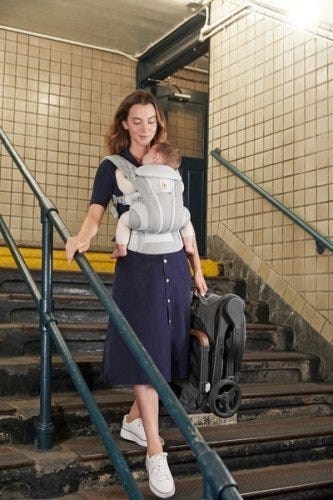

Summer adventures with your baby are a wonderful way to create lasting memories and enjoy the beauty of nature together. From baby carriers to strollers, Ergobaby products are designed to provide comfort and ease for both you and your little one. So, gear up, get outside, and explore the world with your baby by your side.
Ready to embark on your own summer adventures? Check out Ergobaby’s range of baby carriers and strollers to find the perfect match for your family’s needs. Visit our website today and start planning your next outdoor excursion!


























